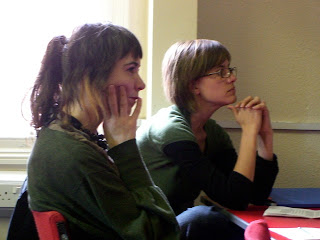Research Week Review: Tuesday, 22nd May 2007 (afternoon session)
Apologies for the lateness (and sketchiness) of this post. And I should point out that it's a kind of collaborative effort. Sally took the notes and I wrote the report!
The afternoon's session was very much focused on museum education and younger audiences.

Mette Houlberg used her presentation to introduce her proposed research project; to explore - using Bakhtin's approach to investigating 'dialogue' - the meaning making processes visitors to the Statens Museum for Kunst, Copenhagen utilise. After giving a little background to her research, Mette provided her audience with a clear understanding of Bakhtin's theories which was, for the uninitiated, much appreciated! She then outlined her planned empirical approach to the project, which will be grounded in qualitative interviews with focus groups comprised of adult visitors to the museum, plus - she hoped - recordings of conversations (dialogues) between visitors as they traverse the galleries.

For the academic year 2006-2007 Anna Chrusciel was based at the Department of Museum Studies as a visiting scholar.

Her research explores the relationship between German museums and teenagers from disadvantaged (educational) backgrounds. Specifically Anna's research investigates museums' social responsibilities from the perspective of young Germans. After providing a brief overview of the German educational system (which appears quite different from its British counterpart), Anna revealed that currently teenagers comprise the smallest group of museum visitors. There is a sense (perceived, or otherwise) that museums were not for them. Using Bourdieu's theory of cultural capital, Anna's research explores the link between educational and family background and museum visiting, and seeks to find ways of empowering young people by getting involved in evaluating and working with museums to improve their relevance for teenagers.
After a quick tea break, Afshan Heuer presented her research into 'Cultural Aspects of Communication and Learning in Museums', concentrating - as her project is in its early stages - on the theoretical perspectives she hopes to utilise. Specifically Afshan has been looking at audience research, pedagogies and theories of communication, and gave a comprehensive survey of changing ideas and attitudes towards these aspects of socio-cultural understanding.

Last, but not least, Anna Woodham gave an update on her research which analyses data collected by a previous RCMG project.

In 'Mapping Museum Visits: Representing exclusion geographically', Anna described how this data has enabled her to geographically map and begin to analyse the pattern of school visits to museums. The focus of her research is on the relationship between museums and schools in disadvantaged postcodes. Interestingly, and - perhaps - surprisingly, Anna revealed that the majority of visits mapped in this project were made by schools from less prosperous areas, and her research will seek to find out why.
The afternoon's session was very much focused on museum education and younger audiences.

Mette Houlberg used her presentation to introduce her proposed research project; to explore - using Bakhtin's approach to investigating 'dialogue' - the meaning making processes visitors to the Statens Museum for Kunst, Copenhagen utilise. After giving a little background to her research, Mette provided her audience with a clear understanding of Bakhtin's theories which was, for the uninitiated, much appreciated! She then outlined her planned empirical approach to the project, which will be grounded in qualitative interviews with focus groups comprised of adult visitors to the museum, plus - she hoped - recordings of conversations (dialogues) between visitors as they traverse the galleries.

For the academic year 2006-2007 Anna Chrusciel was based at the Department of Museum Studies as a visiting scholar.

Her research explores the relationship between German museums and teenagers from disadvantaged (educational) backgrounds. Specifically Anna's research investigates museums' social responsibilities from the perspective of young Germans. After providing a brief overview of the German educational system (which appears quite different from its British counterpart), Anna revealed that currently teenagers comprise the smallest group of museum visitors. There is a sense (perceived, or otherwise) that museums were not for them. Using Bourdieu's theory of cultural capital, Anna's research explores the link between educational and family background and museum visiting, and seeks to find ways of empowering young people by getting involved in evaluating and working with museums to improve their relevance for teenagers.
After a quick tea break, Afshan Heuer presented her research into 'Cultural Aspects of Communication and Learning in Museums', concentrating - as her project is in its early stages - on the theoretical perspectives she hopes to utilise. Specifically Afshan has been looking at audience research, pedagogies and theories of communication, and gave a comprehensive survey of changing ideas and attitudes towards these aspects of socio-cultural understanding.

Last, but not least, Anna Woodham gave an update on her research which analyses data collected by a previous RCMG project.

In 'Mapping Museum Visits: Representing exclusion geographically', Anna described how this data has enabled her to geographically map and begin to analyse the pattern of school visits to museums. The focus of her research is on the relationship between museums and schools in disadvantaged postcodes. Interestingly, and - perhaps - surprisingly, Anna revealed that the majority of visits mapped in this project were made by schools from less prosperous areas, and her research will seek to find out why.
Comments